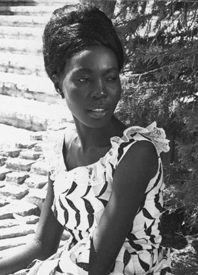
The Criterion Channel comes to In the Seats! I’m taking it upon myself to peruse the films available under what’s arguably the best streaming service ever before my access to it disappears. The most exciting in the program in the service is Martin Scorsese’s World Cinema Project, giving me a chance to cross out bucket list films. But it also allows its users to revisit films that made them love and study the art form like Ousmane Sembene’s Black Girl. It’s about Diouanna (Mbissine Therese Diop), a Senegalese woman. At first, she was happy to clean her French boss’ (Robert Fontaine) apartment.
France represents a hope for Diouanna, a hope that her boss and his family crushes. She eventually realizes that she’s not just a cleaner but a cook and a nanny. She serves another latent function in that household. The family uses her as a living exhibit. She’s a contemporary version of the Hottentot Venus for the family’s guests to kiss and touch without her consent. The film exposes these dualities. The camera gives ample space to show her outrage. She’s constantly close to tears in the scenes where she’s in France. Meanwhile, her boss’ wife (Anne-Marie Jelinek) gives her compliments that obviously don’t work.
I explained Diouanna’s situation to my roommate, who assumed that she’s a victim of sex trafficking. That’s not necessarily the case here, but half of the film puts her in close quarters with her boss. And there’s an implication here that he might take advantage of her. The film then presents another ironic duality. Audiences assume that the West presents a freedom for women of color facing oppression in the ‘Third World’. Here, France only exists as a claustrophobic apartment. Meanwhile, it shows Dakar as a place where she can walk freely.
I find myself stuck in writing about the dualities and ironies in Diouanna’s life and the film presents a third one concerning work. She exists in the household to relieve the Frenchman’s wife of her duties. Earlier in the film we see her dancing joyously, sometimes in the Madame’s hand me downs. She doesn’t know that the job eventually emotionally destroys her. This film didn’t invent the downward spiral of a female protagonist. It’s a trope that we’ve seen white directors and playwrights like D.W. Griffith and Tennessee Williams use. What this film does is make that struggle relate-able, garnering emotional responses from people experiencing this for the first time.
Black Girl is available through the Criterion Channel.

